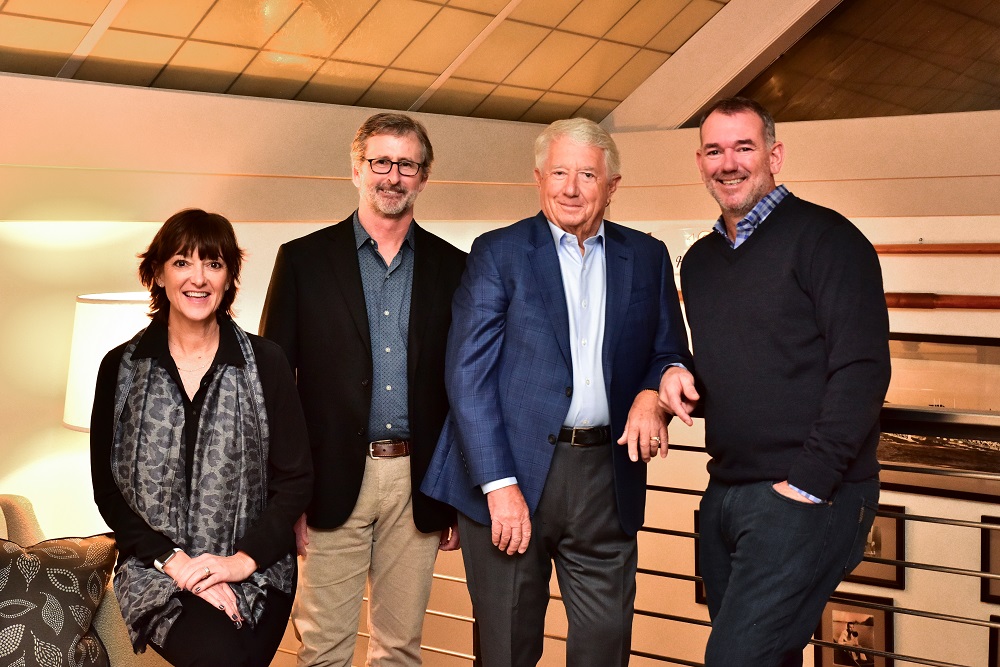Windermere founder John Jacobi earns UW degree six decades after commencing studies at the Foster School
The UW Foster School of Business Class of 2020 graduated virtually this week after an anomalous end to an extraordinary year. Among the resilient ranks receiving diplomas was one person as suited to deliver a commencement address as he is to consume one.
Some 61 years after beginning his business studies at the UW, John Jacobi has—finally—graduated.
Jacobi is the founder and retired chairman of Windermere, the largest real estate companies in the western United States. Having left day-to-day operations to the second generation of family leadership a few years ago, he finally found time and inspiration to complete the work and finish a journey that commenced in 1959.
“A few guys in school stretched out their education for five or six years. I even knew a guy who took seven,” says Jacobi, with a laugh. “But I never heard of someone taking 61 years to graduate!”
Six-decade detour
That’s not how he planned it. Jacobi’s affinity for the UW goes way back. He grew up just a few miles north of campus (in a beach cottage on Lake Washington) and began a nearly religious lifelong commitment to Husky athletics when he began attending football games with his father at age seven.
After graduating from Roosevelt High School in 1959, he was determined to become a Husky himself.
First, though, he had to serve six months active duty in the Coast Guard to fulfill a portion of his national service obligation. When Jacobi finally turned up on campus for winter quarter, he was already several credit hours behind. And when his classmates were donning cap-and-gown four years later, Jacobi was still a few credits short.
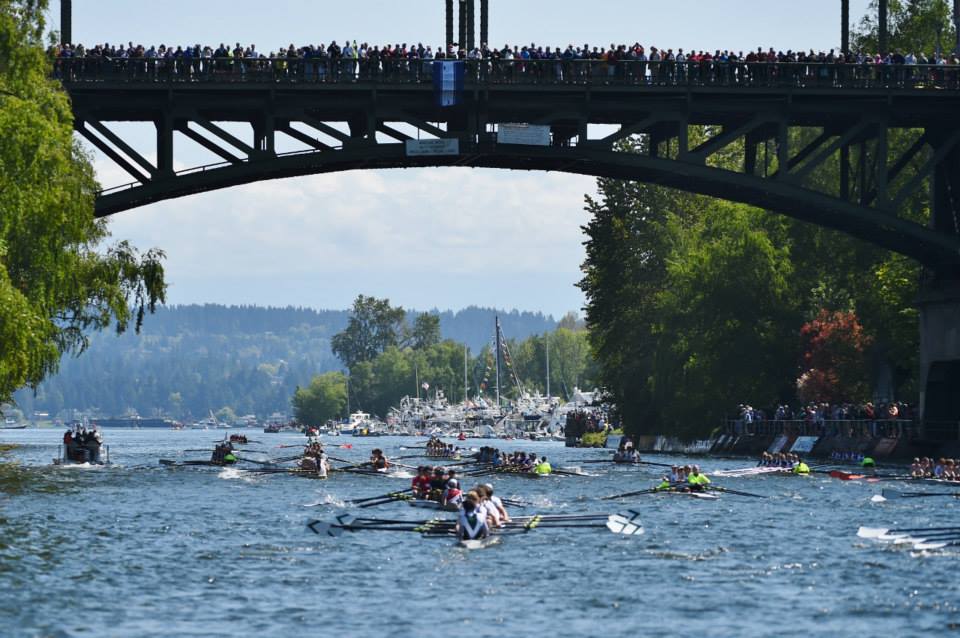
A lifelong love of boating and Husky athletics inspired Jacobi to launch the Windermere Cup in 1987.
“I had every intention of going back to finish,” he says. “But I got married, started having kids and I needed to work—a couple of jobs, in the early days. It just became one of those things where I’d say, I’ll get to it next quarter…”
Jacobi became a utility player, of sorts, for Puget Sound Mutual Savings Bank, which turned out to be his big break. He started off soliciting loans from real estate brokers, then created advertising campaigns and, eventually, selected locations for new bank branches, exposing him to all manner of players in the real estate business.
Ten years flew by. He loved the bank and its people. But with many mouths to feed by this time, Jacobi had to do property appraisals and conduct surveys on the side just to make ends meet.
“I had learned to make money for the bank and now I wanted to do my own thing,” he recalls. “It was very important to me to be independent.”
A risky bet
It wasn’t the ideal time to do his “own thing.” Seattle in the early 1970s was on life support. The infamous Boeing Bust kicked off an era pockmarked by Vietnam, Watergate, a global energy crisis, skyrocketing unemployment and interest rates, and interminable years of “stagflation.”
Yet Jacobi was undeterred. He and a friend considered buying a golf course and a plumbing supply company before noticing a small real estate office for sale in the Windermere neighborhood of Seattle, not far from the UW and his childhood home.
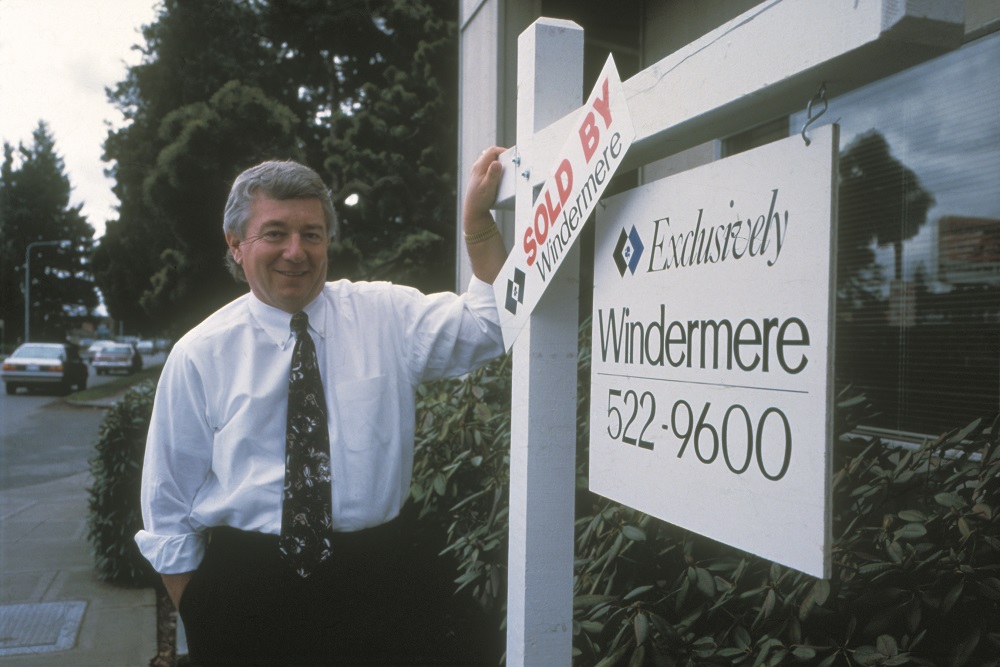 Jacobi borrowed $15,000 for the down payment from his father—a huge sum of money for him to loan his son—on an $85,000 purchase. “It was a ridiculous amount of money at the time,” Jacobi says. “I didn’t know anything about real estate. I’d never sold a house (and I actually never have).”
Jacobi borrowed $15,000 for the down payment from his father—a huge sum of money for him to loan his son—on an $85,000 purchase. “It was a ridiculous amount of money at the time,” Jacobi says. “I didn’t know anything about real estate. I’d never sold a house (and I actually never have).”
Worse, the eight agents at the office were all independent contractors, with every right to walk out the door if they didn’t like the look of the new owner. “I’d have paid $85,000 for a bunch of metal desks and some indoor and outdoor carpeting,” he jokes.
But they didn’t walk. And Jacobi learned volumes from that core team of agents who were both educated and ethical in a business which, at the time, was often blighted by shady sales tactics.
He never had much time to dwell on the future. Success, to him, was just enjoying the work and making enough money to take care of the family.
“It was tense in those early days,” Jacobi remembers. “A matter of survival.”
Until it became more. Much more.
In and of the community
Windermere became known for its indelible culture, unwavering integrity and strategic growth.
In 1984, his little real estate company having expanded to eight Seattle offices, Jacobi decided to venture beyond city borders for the first time. Rather than open an office on nearby Bainbridge Island, he introduced an affiliate relationship.
“It became apparent that Bainbridge agents might get more business from Seattle,” he says. “But I didn’t want to partner with someone that far away. I didn’t understand his marketing on Bainbridge and he didn’t understand mine in Seattle.”
This bright idea developed into a franchise network that grew contiguously over the ensuing years. Eventually Windermere offices dotted the Washington map, then Oregon, then beyond.
Today, more than 6,500 Windermere agents work out of 300 offices in a network that stretches from Alaska to Arizona, Montana to California, Hawaii to Mexico.
Jacobi believes this growth has come from a focus on community over size or sales. From really listening to the wants and needs of customers. And from getting involved in their communities. “I mean, we are selling houses in the community. That’s how we make a living,” he says. “So why wouldn’t we support those communities?”
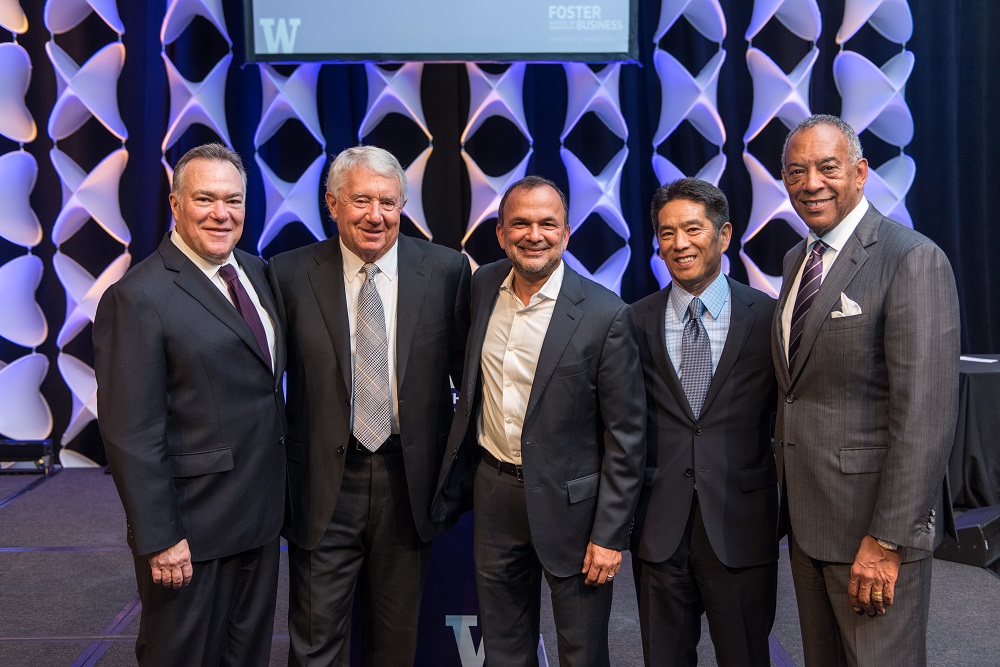
Former Dean Jim Jiambalvo with Distinguished Leadership Awardees John Jacobi, Steve Singh and Gary Furukawa, and keynote speaker John Thompson at the Foster School’s 2015 Business Leadership Celebration.
It started with sponsorship of Little League teams and middle school orchestras, which resonated with both clients and employees. Jacobi established Windermere’s annual Community Service Day in 1984. His lifelong support of Husky athletics became most evident in the 1987 launch of the Windermere Cup, which pits Husky men’s and women’s rowing against the best in the world each May. And the Windermere Foundation, established in 1989, has provided more than $30 million to non-profit organizations that support low-income and homeless families.
A few years ago, Jacobi and his wife, Rosalind, whom he met at the UW, made a $5.4 million gift to their alma mater to create an undergraduate minor in real estate studies and two endowed faculty chairs.
A family way
Jacobi has received plenty of accolades for his life’s work. Washington CEO named him to its Power 100 list of people who have shaped the region in 2002 and named Windermere the “Top Private Company” in 2008. The company received the Succession Award from Seattle Business in 2013. In 2015, Jacobi received the Foster School’s Distinguished Leadership Award. And this fall, the Jacobi family and Windermere will receive the 5th Avenue Theatre’s 2020 Excellence Award for their unwavering support of the community.
But John Jacobi prefers to spread credit for Windermere’s success and philanthropy far and wide: to his parents, mentors, employees and legions of friendships forged over a lifetime.
“My whole career is built upon relationships with people,” Jacobi says. “And most of them were made at the University of Washington.”
Most, but not all of them. A few key relations came in the years after, namely his children who have been part of the business since they were kids sweeping sidewalks. Today, they are building on their father’s legacy.
Chief among the second generation of family leadership are son OB Jacobi, daughter Jill Jacobi Wood and son-in-law Geoff Wood, who serve as co-presidents of Windermere Real Estate (Wood, who received his master’s degree from Foster in 1993, is also CEO of Windermere Services Company).
Though retired as chairman, John Jacobi still serves on the company board. And he watches his progeny work with equal measures of admiration and pride.
“How do you measure success?” he asks himself. “To see my kids take something that I’ve created and turn it into something even better… that’s about as good as it gets.”
Never too late to graduate
A college diploma is another measure of success. And failing to finish at the UW had always bothered Jacobi. A family full of teachers—including his sister, two of his daughters and his wife, Roz—always encouraged him to complete his education.
And it’s fitting that yet another generation of the family indirectly sparked his commitment to earn his place among the graduating UW Class of 2020.
When Jacobi attended the commencement of one of his granddaughters from the University of Wisconsin a few years ago, it was, somehow, the first he had ever experienced. “That’s what got me thinking about it,” he says. “The stadium was full, the kids were having a great time. Katie Couric was a terrific speaker and she kind of inspired me. I wasn’t expecting that.”
So, he went back to school. There was to be nothing honorary about his UW bachelor of arts degree in business administration. He had to earn it.
To fulfill the missing credit hours, Jacobi submitted a series of research papers mining his expertise in the real estate business (each requiring a baker’s dozen revisions before passing his exacting standards). “I thought this would be pretty easy,” he says, “but I really worked hard.”
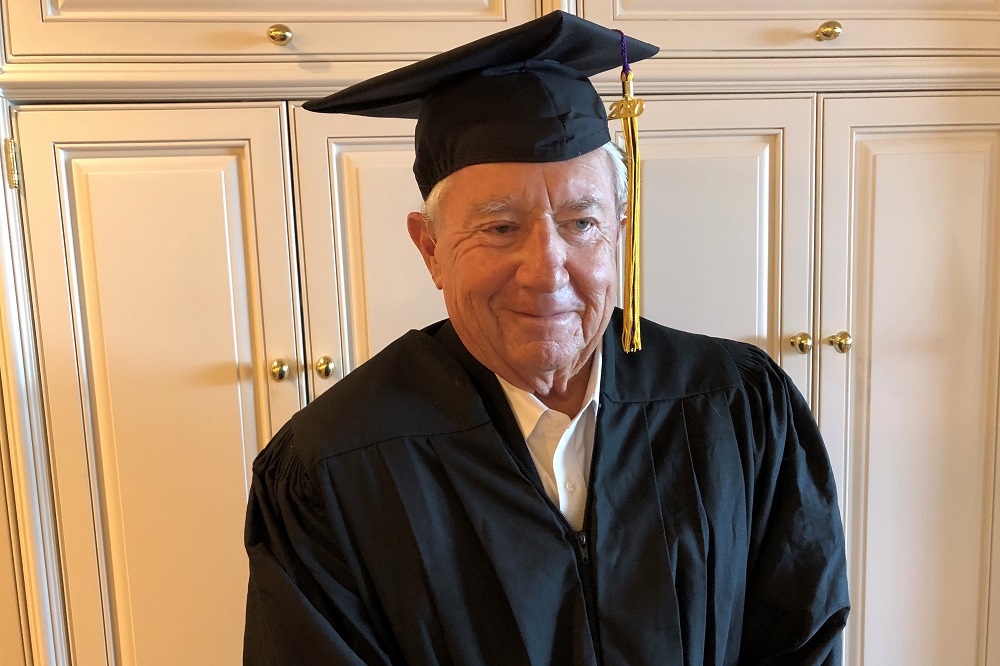
John Jacobi finally earns the right to don the cap and gown with the graduating UW Foster School Class of 2020.
Now that the work is done, he plans to celebrate—online, at first, alongside classmates who could be his grandchildren. Then in September, the sprawling Jacobi family will gather to celebrate their patriarch’s 80th birthday and UW graduation. “I intend to wear the cap and gown,” he says. “And I intend to have the music play, because it’s one of my favorites.”
It turns out that Jacobi’s education and experiences at the UW were more essential than a degree as he built an iconic real estate company over his remarkable career. But the degree was always on his mind.
To understand why, you have to look to another generation of his family: his beloved parents. Jacobi’s mother was an artist who could do anything from wood carving to fashion sketches, the neighborhood’s “cool mom” always welcoming his friends. And his father was a learned man who came of age in the era of the Boys in the Boat—his story resembled theirs in many ways. He rose from nothing to earn a UW degree on a football scholarship and forge a satisfying career in advertising, teaching journalism at the UW on the side.
“My dad always preached education as the key to success, and he was right,” Jacobi says. “Despite my success, I always felt I’d let him down, in a way. So now I’ve accomplished what he was bound and determined for me to accomplish. And I feel pretty good about that.”
Advice for the Class of 2020, from one of their own
“Build upon the relationships you have made in school. Keep in contact with the ones you respect and pick their brains as life moves along as to what to do, how to do it, etc. Sometimes your good ideas for the future will come from colleagues you met in college. Having contacts that you can communicate with through your business career is not only important but it is also fun. Don’t forget that fun part.”
– John Jacobi

